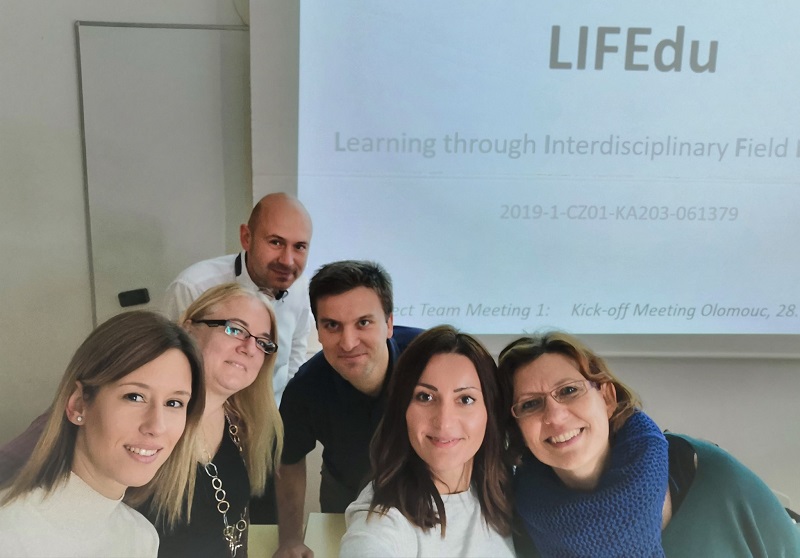LEARNING THROUGH INTERDISCIPLINARY FIELD EDUCATION
Project Title: Learning through Interdisciplinary Field Education
Akronym: LIFEdu
Project ID: 2019-1-CZ01-KA203-061379
Total Project budget: 116 019,00 EUR
Start Date: 1 September 2019
End Date: 31 August 2022
Leading Institution: Palacky University Olomouc
Partner Institutions: University of Novi Sad, University of Maribor
Project members from University of Novi Sad: PhD Smiljana Đukičin Vučković (manager), PhD Jelena Milanković Jovanov (administrator), PhD Anđelija Ivkov-Džigurski (member), PhD Ljubica Ivanović Bibić (member)
Field education is an effective and innovative teaching practice at all levels of education. It can be applied both to the teaching of almost all stand-alone subjects (or broader fields) and to the integrated concept of teaching. A suitable way of applying field education into school curricula, resp. its subsequent implementation in practical teaching contributes to the effective acquisition of a number of key and professional competencies. That can consequently result in effects such as student can be better placed on the labour market, obtain the ability to think complexly (in interdisciplinary context), solve problems, work in team with personal responsibility, work with modern technologies, etc. For these reasons, the topic of interdisciplinary field education is the main idea of the whole strategic partnership, in which participate Palacký University Olomouc (as a coordinator), University of Maribor and University of Novi Sad (as partner institutions).
The main objective of the project is to make the form of field education visible and to point out its advantages when enrolled in practical teaching within all levels of education. The ambition of the project is to bring such innovative practices to make the field education an integral part of school curricula, and as such to gain a solid place in regular school classes. All project activities and essential outputs are planned with regard to the most effective achievement of the main goal using the potential of the research team and involved institutions. Among the most important activities of the project belong intensive study programs focusing on both theoretical and practical aspects of interdisciplinary field education, as well as short-term trainings of pedagogical staff focused on field education, elaborating of interdisciplinary methodological, resp. teaching materials useful during field education and also an international conference focused on dissemination of project results. One of the key outputs of the project is the proposal of field education implementation into the school curricula of each level of education (in the case of higher education into selected programs educating future teachers of primary and secondary schools), respectively into curricula based on interdisciplinary international research and experience of individual members of the project team.
The primary target group of persons supported by the project activities are university students and pedagogues from the universities involved in the strategic partnership. Within the frame of dissemination activities, the target group will be significantly extended to include students and teachers also from other universities, teachers of primary and secondary education as well as teachers of non-formal education. Innovation, respectively the big difference compared to the traditional approach to the implementation of curriculum proposals is enshrined in the project solution itself, where the first and second steps will be to analyse national and school curricula, respectively to elaborate an international comparative analysis. Such analysis will be the basis for the creation of practical proposals for new or innovative integration of field education into school curricula of all levels of education with examples of specific educational field activities.
Another difference from the traditional approach is the active involvement of teachers and students of teacher training fields in selected project outputs, which will strengthen the connection between students and their teacher. The course participants will also try out field activities by themselves and in an authentic environment they will become acquainted with the potential and ways of removing the barriers of such a conceived course, regardless of their qualification or level of education. This will lead to a practical understanding of both horizontal and vertical relations in the teaching process. Due to the planned way of disseminating project’s practical outcomes, it is expected to influence a wide range of teaching staff and students.
In the period from June 26 to July 2, 2021, a training was held in which, in addition to the team from Serbia, teams from Olomouc and Maribor also participated. Teams in all three countries consisted of university professors, students, and primary and secondary school teachers.
During the intensive online training, the participants learned more about field teaching, the rules of conducting this teaching, and they were also presented how field teaching is conducted and what place it occupies in the curriculum of Serbia, the Czech Republic, and Slovenia. During the training, the participants first designed activities in national and then international teams that could be performed within the teaching of geography, but also in cooperation of geography with other subjects. The designed activities were later verified in the field within the national teams. Topics covered by the activities are Quality of life in cities, Brownfield locations, as well as Nature in cities.
The training was successfully completed, and the results were presented on the last day.
In the last week of September 2021, members of the project team, students, colleagues employed at DGTH, and fellow teachers from schools in Maribor are planned to continue working in international field groups in Slovenia, while the team from Serbia will host colleagues in the spring of 2022. from the Czech Republic and Slovenia in Novi Sad.











